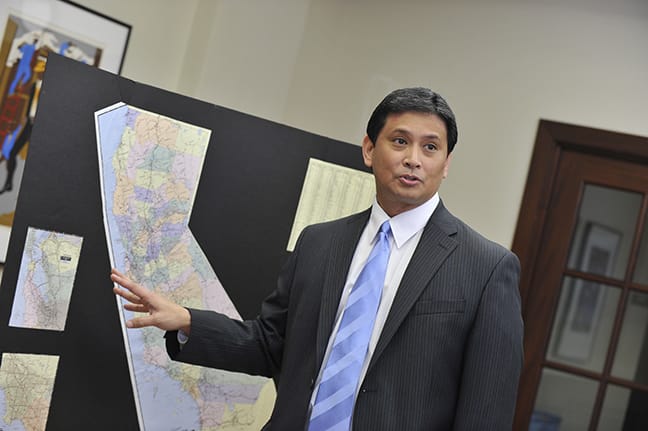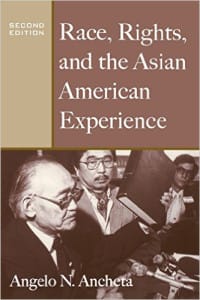Student Showcase: Angelo Ancheta

In our latest installment of Student Showcase, the Flame caught up with Angelo Ancheta, a PhD student in political science and former law professor at Santa Clara University, to discuss his academic and professional involvement in civil rights as well as his role in an ongoing Supreme Court case that could decide how colleges and universities consider racial minorities in their admissions policies.
You’re pursuing a PhD in political science here—what brought you to CGU?
I’ve been involved in civil rights and minority voting rights since the late 1980s, first as an advocate and more recently in legal education, so I decided to pursue a PhD to complement the academic work I was already doing. Until recently, I was a law school clinical professor and the director of a legal clinic serving low-income clients. I also taught classes in constitutional law and voting rights. I’ve also been involved in public policy work, including serving on a state [California] commission in charge of congressional and state-level redistricting. Much of the scholarship on voting, redistricting, and election law has become interdisciplinary, so graduate work in political science was a natural outgrowth of my earlier work. CGU has particular strengths in American politics and research methods, and the program provides great flexibility for part-time students.
What research specific to your degree are you working on here at CGU?
I’ve been focusing primarily on American politics and on research methodologies while at CGU. A lot of my course-related research has focused on either voting behavior or the judicial process, and I’ve employed econometrics, computational modeling, and geographic information systems in my work. Right now, I’m developing some dissertation-related research that focuses on models of minority voting behavior and the federal Voting Rights Act. I’m particularly interested in settings that involve multiple minority groups and how intergroup cooperation and competition can be modeled.

Why are the issues of civil and immigrants’ rights of interest to you?
Many of the roots of my interests are personal. I grew up in San Francisco during the 1960s and 1970s, and as a child of immigrants from the Philippines, I often dealt with discrimination firsthand, and many of these issues therefore had an impact on my professional life. Early in my career, I practiced immigration law. I had also been involved in civil rights issues affecting Asian Americans while in college and law school, so [these issues] have been important elements of my professional career. My academic work continues to focus on racial minority rights in areas such as higher education and voting.
Can you briefly describe your role/actions related to Fisher v. University of Texas? How did you get involved? What did the brief essentially argue?
Since the early 2000s, I’ve worked with organizations and research centers that have contributed to the social science literature demonstrating the benefits of racial and ethnic diversity in K-12 and higher education. When I was working for the Civil Rights Project at Harvard University, I wrote a couple of amicus curiae (friend-of-the-court) briefs on behalf of the American Educational Research Association [AERA] in the University of Michigan affirmative action cases. The US Supreme Court’s 2003 ruling in Grutter v. Bollinger upheld the constitutionality of race-conscious admissions to promote diversity in higher education, and the court cited and quoted one of the briefs I authored. The Fisher case is one of a number of cases that have arisen since 2003 that have challenged race-conscious policy making, and the amicus brief on behalf of the AERA and other research organizations summarizes more recent social science literature bearing on the constitutional questions in the case. In particular, the Fisher case tests whether a university that already employs a race-neutral admissions policy to promote diversity (the University of Texas’ “percent plan” guarantees admissions to the top high school graduates in that state) can supplement its program with a holistic admissions policy that considers race as one of many factors. In essence, the brief argues that the literature continues to support the benefits of diversity (including preventing harms associated with racial isolation) and [purports] that race-conscious admissions are necessary to advance the university’s diversity interest because race-neutral policies are simply not as effective in advancing racial diversity.
Why is this case significant to higher education?
Depending on how the Supreme Court rules, we could see significant limitations on the use of race as a factor in higher education admissions. Although the Fisher case deals specifically with undergraduate admissions at a state university, the court’s ruling could have major ripple effects in graduate and professional education and among private colleges and universities that are bound by federal civil rights statutes. Although it’s unlikely that the court will overrule the University of Michigan case, it may seriously limit the ways that race can be used in admissions. However, if the court does uphold the University of Texas’ policy, we can expect most institutions to maintain their status quo.
Did any of your CGU experiences/research/etc. inform your work with Fisher v. U of Texas?
Gaining additional methodological training at CGU in fields such as experimental methods, econometrics, and computational modeling has helped a great deal in understanding the educational research literature, which employs many of the same methodologies. It’s become much easier for me to understand the strengths and weaknesses of research studies because of my own social science training.
With your professional background in law, how will a PhD in political science help your future goals post-CGU?
I haven’t abandoned my interest in laws and legal processes, so I’m hoping that the PhD will enable me to do interdisciplinary research work addressing problems in public law and in the political process. I’m keeping my options open in terms of the type of job, including college/university teaching or working at a research organization or think tank, but I’m hoping to put both degrees to good use.
To see Angelo Ancheta (as a member of the California Citizen Redistricting Commission) discussing the state’s redistricting process, click on the video below. (Video courtesy of the Markkula Center for Applied Ethics at Santa Clara University)
https://www.youtube.com/watch?v=ky-xaGgSIgY